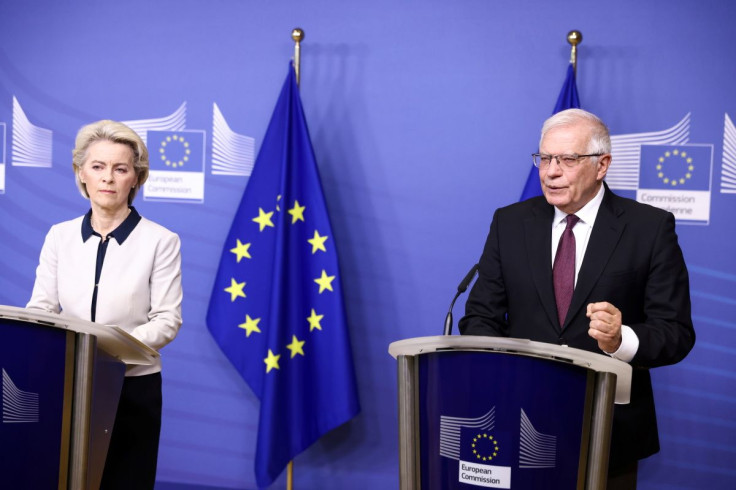EU Promises Further Sanctions As Ukraine's President Pleads For More

The European Union is planning a third round of sanctions against Moscow, an EU official said on Friday, minutes after Ukraine's president pleaded with the bloc for faster and more forceful steps to punish Russia for its invasion of his country.
The official said that ambassadors of the EU's 27 member states agreed - even before the next wave of sanctions are approved - on Friday to freeze the European assets of Russian President Vladimir Putin and Foreign Minister Sergey Lavrov.
"We are moving as quickly as we can," said the official, who spoke on condition of anonymity, adding that the bloc could also target "many more" Russian oligarchs than it has already.
Earlier on Friday, Ukrainian President Volodymyr Zelenskiy urged Europe to act more quickly and forcefully in imposing sanctions on Moscow, accusing western allies of politicking as Moscow's forces advanced on Kyiv.
"You still can stop this aggression. You have to act swiftly," he said, adding that banning Russians from entering the EU, cutting Moscow off from the SWIFT global interbank payments system and an oil embargo should all be on the table.
EU foreign ministers will meet in Brussels from 1400 GMT to thrash out details of a package of sanctions - the EU's second this week - that was agreed in principle by their leaders at an emergency summit that ran into the early hours of Friday.
The leaders' agreement meant the bloc is joining the United States and others in taking steps such as curbing Russia's access to key technologies and financing.
The sanctions will also target Russian elites and make it tougher for diplomats to travel, but the EU leaders opted not to curb Russian energy imports, or - after objections from Germany and Italy, among others - cut Russia off from SWIFT. A decision to sanction Putin and Lavrov personally came on Friday.
French Finance Minister Bruno Le Maire, hosting a meeting of EU counterparts in Paris on Friday to discuss the economic consequences, said removing Russia from SWIFT transactions remained an option, but only as a last resort.
The Dutch and Luxembourg prime ministers, Mark Rutte and Xavier Bettel, said the measures agreed at the summit were very substantial, hitting Russia hard in many sectors.
Putin had done everything he could to divide Europe, Rutte said, but he had only managed the opposite.
Bettel said the most emotional moment of the EU summit was when Zelenskiy addressed the room remotely from Ukraine.
"He told us he doesn't know whether he will be able to speak with us another time so it's tough. We have to know how serious the situation is in Ukraine," he said.
(Writing by John ChalmersEditing by Tomasz Janowski)
© Copyright Thomson Reuters 2024. All rights reserved.







